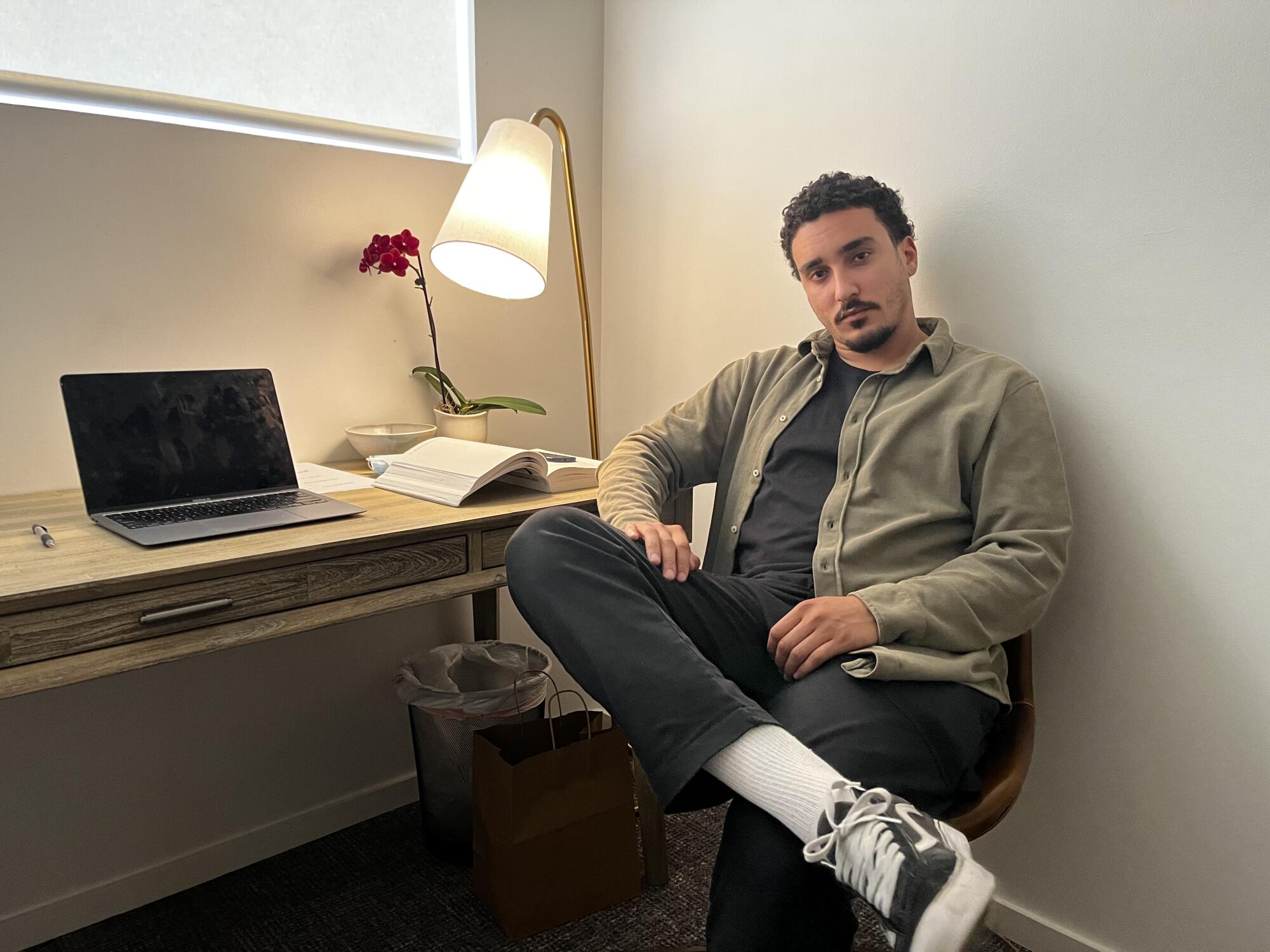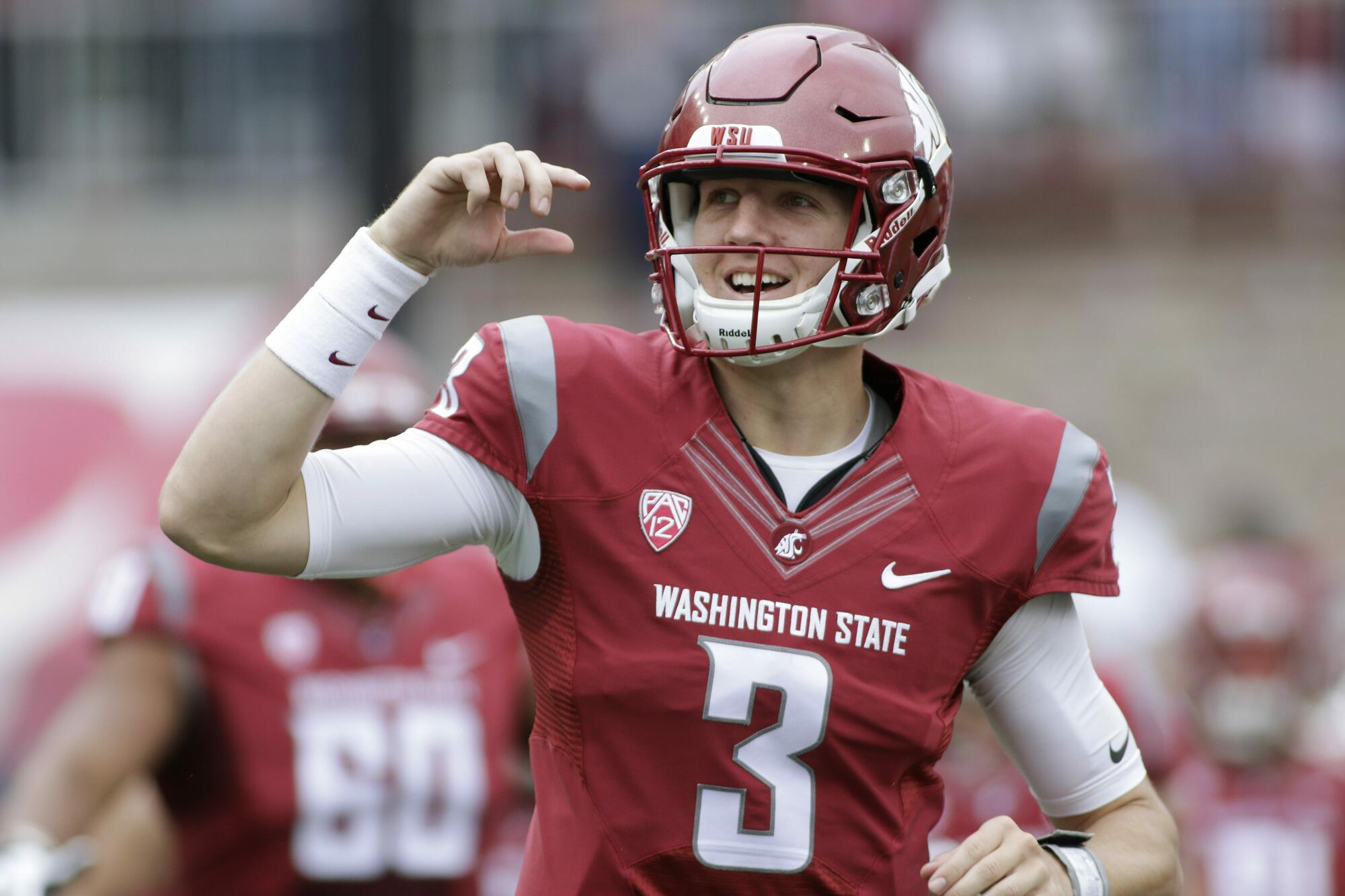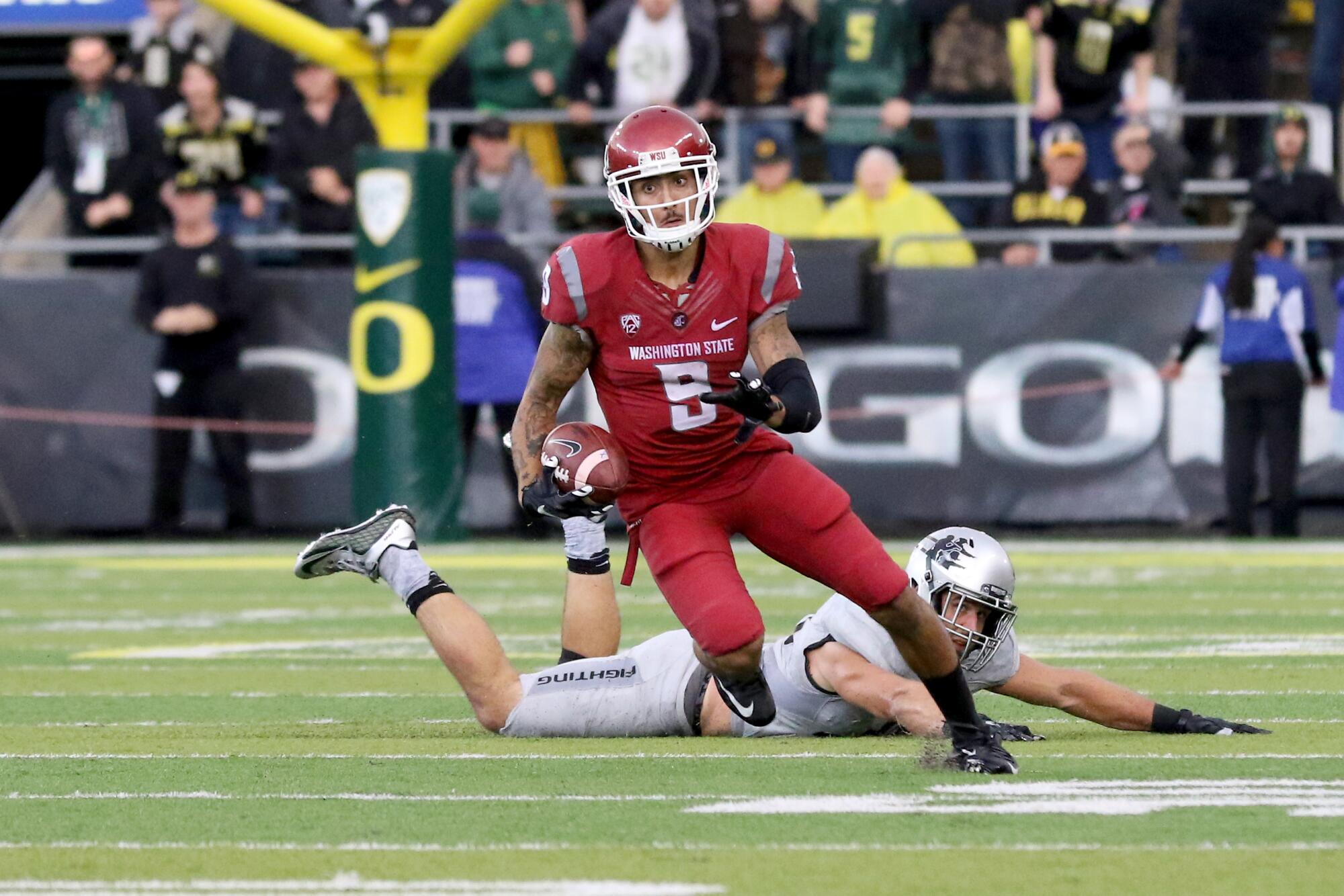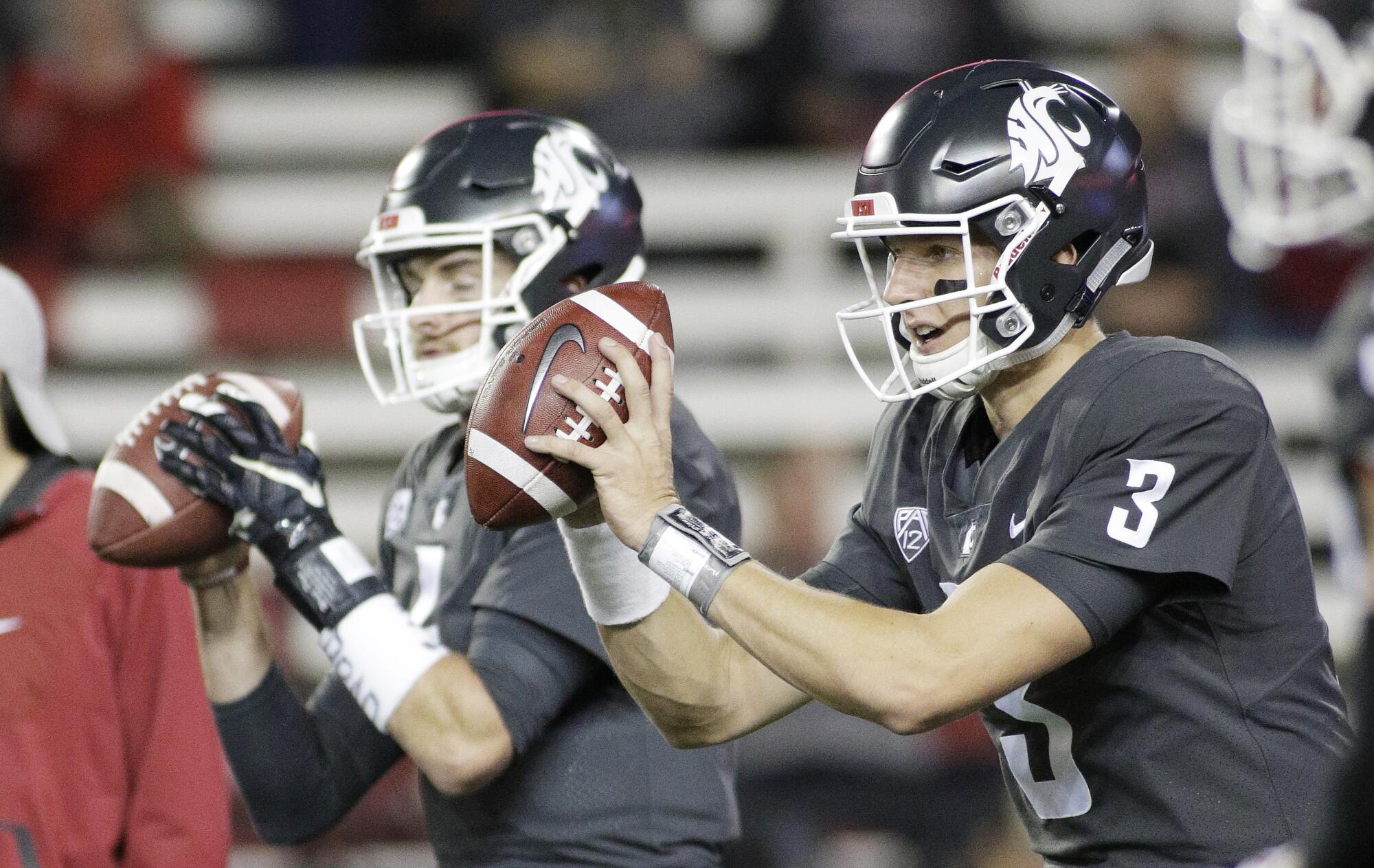- Share via
The notes of smooth jazz float through Gabe Marks’ office in Mar Vista, a blank space devoid of fuss.
A few years ago, Marks’ life was more about violence. Glory. Pain. A decorated wide receiver for Washington State, he spent his days roaming fields of green, releasing the anger with every route, catch and stiff-arm.
Now, his only company in this room is a couple of paintings, a long-stemmed flower on his desk and the clients he sees daily as a clinical psychologist. His thoughts are contained within four eggshell-white walls, the only connection to the outside world a window above his desk. He can’t hide behind a helmet anymore.
“This is my natural habitat,” Marks said, fingers toying with the buttons on his flannel shirt. “I like being in my solitude, to be able to reflect and think.”
In January 2018, Marks was a few months removed from giving up on his NFL dream and had started working on a master’s degree in clinical psychology when he got the news: Former Washington State teammate and friend Tyler Hilinski had died by suicide.
Suddenly, the concept of mortality didn’t seem so far off. Marks was one of many from those Cougars teams on the fringes of professional football, and the circumstances of the loss made them turn inward, finally addressing the anxieties from a career under the spotlight that they all felt but never discussed.

A few years later, Marks is practicing at Mission Harbor Behavioral Health, inspired to one day serve as a counselor for professional teams and players. He’s one of a few on that Washington State team who’ve taken a particular interest in mental health in football after Hilinski’s death.
“That was just a tipping point, I think, for everybody, all the collective band of brothers that were involved with that program,” Marks said. “We just had to take a step back and had to reevaluate a lot of things in our lives. A lot of us, our trajectories went in slightly different directions after that moment.”
They couldn’t help Hilinski. It’s taken many of his former teammates a long time to come to terms with that. But maybe they can help someone else.
::
Nick Begg knew he couldn’t touch Hilinski in practice, the backup quarterback donning a red “no contact” jersey. The Washington State defensive lineman would still make a point to chirp at him anyway.
“That was a sack!” Begg would yell. “I’m coming for you again!”
“You’re not even going to get close,” Hilinski would retort.
Hilinski was one of the happiest guys Begg had met. Funniest, too. The trash-talk still sticks out.
“It’s the last thing you expect a second-string quarterback to do in practice,” Begg said, his voice swelling over the phone. “It’s something I’ll cherish forever.”
Begg hosted Hilinski on his recruiting trip when he first visited Washington State, the two bonding over a shared Southern California heritage. Begg took the quarterback under his wing, and they became fast friends.
On Jan. 16, 2018, Hilinski missed a Lyft ride to a workout earlier in the day. Nobody had heard from him — out of character for a gym rat like Hilinski. A strength coach sent Begg and linebacker Peyton Pelluer, Hilinski’s roommates at the time, to track him down.

They went searching through town, talking to Hilinski’s brother, hearing of a text sent to an ex-girlfriend.
“That’s when things started getting tense,” Begg said softly.
They went back to Hilinski’s old apartment, Begg said. Management wouldn’t give them a key. On a feeling of instinct, Begg said, he and Pelluer broke down the door. That’s where they found the body.
Staring at the sight, Begg went into shock. Athletes are used to feeling in control of their environment. He was helpless.
“I don’t even know if I had any logical thoughts at that point,” Begg said.
According to Pullman, Wash., police, Hilinski shot himself in the head. He left a note and had a rifle.
“I actually worry about Peyton and Nick,” said Kym Hilinski, Tyler’s mother, “because I can’t even imagine how hard it had to have been to find Tyler.”
In the weeks and months after, Washington State made counselors and psychologists available to team members. An autopsy found Hilinski had C.T.E. Begg, and others, came to realize that any one of them could have been feeling the same things the “universally loved” quarterback did — they rarely knew him beyond a smile on his face.
“Someone like that might be scared to show weakness, in that he knows that this is who he is and that this is what people expect out of him,” Begg said.
The week of Hilinski’s death, a troop of former teammates visited Pullman. About eight of them stayed with him and Pelluer, Begg remembers, carving out a sliver of room on a sofa or a chair or just the living room floor. They drifted off to sleep together, realizing how deep these relationships ran and quickly they could be taken away.
“It really just becomes a part of your life,” Kym Hilinski said.
::
Marks was at a Mexican restaurant in Pasadena that January with Parker Henry, a former Washington State teammate visiting from out of town, when Henry got the call from a mutual friend about Hilinski’s death.
It was a moment they’d never forget. Marks has experienced those before.
When he was 9,his grandfather walked in and told Marks that his dad had been killed, the victim of gang violence in his childhood Venice neighborhood.
“I remember feeling as though something had been taken from me,” Marks said, “but I didn’t know how to process it in the moment.”
A year later, Marks began playing football.
He was good at it. He had natural hand-eye coordination, could catch a pass, carried a natural competitive spirit. And he held a lot of anger.
“That was my therapy for a long time,” said Marks, who would become a star at Venice High.

Over four years at Washington State, Marks set the Pac-12 Conference record for receptions. When the trauma came back or anxiety would take hold, he’d dig his cleats in deeper. But after going undrafted in 2017, Marks was suddenly left to float on the fringes of NFL rosters.
“Once [football] is over, all that stuff you were using to propel you in a violent behavior towards your goals — antisocial behaviors and whatnot — you’re suddenly left with them,” Marks said.
As Marks stepped away from football, he began to notice how many were in his same position — guys who’d thrived in college but now felt lost without their emotional outlet.
“Especially with the inflated self-esteem that we’ve gained in these fields … afraid to ask for help because nobody like us is there to help, we fall down these holes where you see these guys ending up in prison,” Marks said. “It’s a really dark place to be after the game is over.”
At the time Henry got that phone call, Marks was already pursuing his degree. Reflecting on Hilinski’s death, he realized there were few services readily available to football players to safely discuss mental health.
“It was the first time in a long time, really, where I had to step out of my box and consider what more I could really be doing,” Marks said.
Now, Marks hopes to help those who have charted his path before — those with unresolved traumas, or who just feel weighed down by the pressure football brings.
::
Henry could never eat before a game.
He’d focus on drinking water. Maybe, on good days, he’d choke down a waffle. But if he tried to gulp down other solid food, he’d vomit.
“You have all these expectations, not only from yourself, but from your family, from your friends, from your coaches to perform,” Henry said.
Now a defensive assistant with USC, Henry tries to stress to his players the importance of mental health and managing anxiety.
“Having a culture that doesn’t shy away from that and make you feel like that’s odd is something that is going to help that person meet that anxiety,” Henry said.
Hilinski, who became a star at Upland High, taught longtime Washington State starter Luke Falk how to view other quarterbacks on the roster as allies rather than competition. Falk, who spent a year with the New York Jets, has now started a service called Four-QB Training that works with young signal-callers on both their physical tools and managing stress. Falk also began to plan for a new company with Begg that they hope will help provide athletes with tools for managing their mental health.

“We just all asked ourselves, ‘What could we have done?’” Falk said. “For me, this was just kind of, ‘Maybe this is how I can help in some small way and affect people in a positive way, like Tyler did.”
Hilinski’s parents, Kym and Mark, founded an organization called Hilinski’s Hope in 2018 that helps connect student-athletes with mental health resources. They’re still in contact with many of Hilinski’s Washington State teammates, including Marks, Begg and Falk, and are grateful to them for taking such initiative to promote mental health awareness.
But the pain will always linger.
“I would trade it all back — I would trade all of Gabe’s success, whatever Nick decides to do and Hilinski’s Hope, to have [Tyler] for a minute,” said Mark Hilinski. “But as long as nobody’s taking advantage of it, I think it’s great.”
There’s a stark need for improved counseling and mental training in sports, as Marks has observed, and he, former teammates and Hilinski’s family are determined to fill it.
Every small victory, though, will always be bittersweet. It’s tremendous this is happening now, Mark Hilinski said.
But he wishes the resources they’re trying to provide now had been there for his son.
More to Read
Go beyond the scoreboard
Get the latest on L.A.'s teams in the daily Sports Report newsletter.
You may occasionally receive promotional content from the Los Angeles Times.










